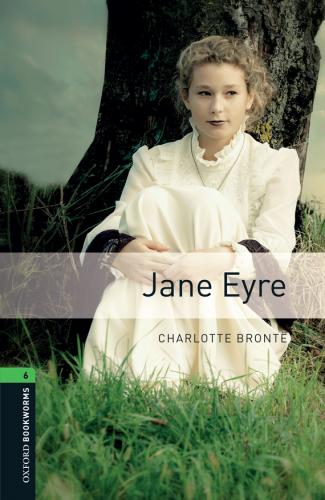CHARLOTTE BRONTË
JANE EYRE
JANE EYRE
Jane Eyre begins life with all the disadvantages that nature and society can give her: she has no parents, no money, she is a girl (in a man’s world), and, to make matters worse, she is not beautiful. She is made even more unattractive, in the eyes of the world, by having a strong character: she will not do what she is told to do.
She does not sound like the heroine of one of the great love stories of the world, and yet she behaves like one. The world looks at her, with all her disadvantages, and tells her to expect little from life. But Jane Eyre refuses to listen; she refuses to accept the unimportant place that the world offers to her. She demands that the world accept her as she is: not important, but the heroine of her own life; not beautiful, but deserving of love.
PEOPLE IN THIS STORY
Jane Eyre
AT GATESHEAD
Mrs Reed, Jane Eyre’s aunt
Bessie, the nursemaid
Miss Abbott, Mrs Reed’s maid
Dr Lloyd
Robert, the coachman
AT LOWOOD SCHOOL
Mr Brocklehurst, the school’s financial manager
Miss Temple, the headmistress
Helen Burns, a pupil
AT THORNFIELD
Mrs Fairfax, the housekeeper
Adèle, daughter of Mr Rochester’s French mistress
Edward Rochester, the owner of Thornfield Hall
Lady Ingram, their mother
Grace Poole
Dick Mason
Mr Briggs, lawyer to Mr Eyre of Madeira
Bertha Mason
AT MOOR HOUSE
St John Rivers, their brother, and vicar of Morton
Hannah, the housekeeper
Rosamund Oliver, daughter of a rich factory-owner
AT FERNDEAN MANOR
PART ONE
A CHILD AT GATESHEAD
1
THE RED ROOM
We could not go for a walk that afternoon. There was such a freezing cold wind, and such heavy rain, that we all stayed indoors. I was glad of it. I never liked long walks, especially in winter. I used to hate coming home when it was almost dark, with ice-cold fingers and toes, feeling miserable because Bessie, the nursemaid, was always scolding me. All the time I knew I was different from my cousins, Eliza, John and Georgiana Reed. They were taller and stronger than me, and they were loved.
These three usually spent their time crying and quarrelling, but today they were sitting quietly around their mother in the sitting-room. I wanted to join the family circle, but Mrs Reed, my aunt, refused. Bessie had complained about me.
‘No, I’m sorry, Jane. Until I hear from Bessie, or see for myself, that you are really trying to behave better, you cannot be treated as a good, happy child, like my children.’
‘What does Bessie say I have done?’ I asked.
‘Jane, it is not polite to question me in that way. If you cannot speak pleasantly, be quiet.’
I crept out of the sitting-room and into the small room next door, where I chose a book full of pictures from the bookcase. I climbed on to the window-seat and drew the curtains, so that I was completely hidden. I sat there for a while. Sometimes I looked out of the window at the grey November afternoon, and saw the rain pouring down on the leafless garden. But most of the time I studied the book and stared, fascinated, at the pictures. Lost in the world of imagination, I forgot my sad, lonely existence for a while, and was happy. I was only afraid that my secret hiding-place might be discovered.
Suddenly the door of the room opened. John Reed rushed in.
‘Where are you, rat?’ he shouted. He did not see me behind the curtain. ‘Eliza! Georgy! Jane isn’t here! Tell Mamma she’s run out into the rain – what a bad animal she is!’
‘How lucky I drew the curtain,’ I thought. He would never have found me, because he was not very intelligent. But Eliza guessed at once where I was.
‘She’s in the window-seat, John,’ she called from the sitting-room. So I came out immediately, as I did not want him to pull me out.
‘What do you want?’ I asked him.
‘Say, “What do you want, Master Reed?”’ he answered, sitting in an armchair. ‘I want you to come here.’
John Reed was fourteen and I was only ten. He was large and rather fat. He usually ate too much at meals, which made him ill. He should have been at boarding school, but his mother,
